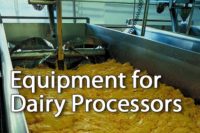Chris Sinutko, SPX Flow Technology: Mix-proof valves in manifolds allow processers to maximize their product recovery. Valve bodies welded closely together in a compact matrix reduce dead-legs in the system. The double seat and safe separation of the mix-proof valve makes the transition from production of one product to another or from production to cleaning seamless and with minimal waste of the product.
Jim LeClair, SPX Flow Technology: Pump application knowledge is the key. Understanding how the processor wants to move his products allows the pump application engineer to size a pump that will maximize the usage of that pump in energy and minimize the product losses associated with pump downtime. This allows the processor to maximize his OEE (overall equipment effectiveness) of the process in relation to pumps.
Sam Raimond, Fristam Pumps: The best way to minimize waste in any process is to choose the most efficient pump for the duty point of the application. Lower efficiency directly correlates to waste and product damage. Operating centrifugal pumps at lower RPMs is not always the most efficient. Pumps with self-priming capabilities can provide efficient, complete evacuation of tanks and lines during normal process or CIP, saving product and expensive CIP solution.
Dairy Foods:Demand for cheese and for yogurt, especially Greek-style yogurt, has processors adding lines or building new plants. Help them choose the right products. What should they look for when considering pumps and valves for a cheese plant? For a yogurt plant?
Doug Harper, Tetra Pak: The demand for high performance has been a deciding factor for many new lines and plants being installed. The ability to achieve high production capacities with fewer valves is accomplished with mix-proof valves designed for continuous production. Valve selection should take into account the hygienic design, ease of maintenance and cost to maintain the valve itself.
Sinutko: We recommend using mix-proof valves. Although these valves are an investment up front, we believe the benefits (both financially and operationally) can be quickly realized: operating continuously, greater annual capacity, maximized product recovery, minimized cleaning downtime, and increased production flexibility.
For the specifically viscous products of cheese and yogurt, plants should look at valves that can gently handle the product without shearing. These would be larger size valves with long stroke actuators that provide a greater opening between the valve body and seat and have minimal pressure loss across the valve.
Denoth: It is important to have a focus on process-related components that will enhance the quality of products being produced. This means selection of valves with stem seals and internal designs that are more easily cleaned-in-place and could include the use of ultra-clean or aseptic designs to provide the highest level of hygiene within the process.
In the realm of cultured products, such as Greek yogurt, selection of valve components is critical when the objective is to utilize extended run cycles to maximize production.
Medlar: For more viscous products such as Greek-style yogurt, the sanitary design and cleanability of the internals of a PMO mix-proof valve are extremely critical. It is even more crucial for processors to consider the internal design of the PMO mix-proof valve for this application to ensure that internal hard-to-clean crevices and gaps are not present.







